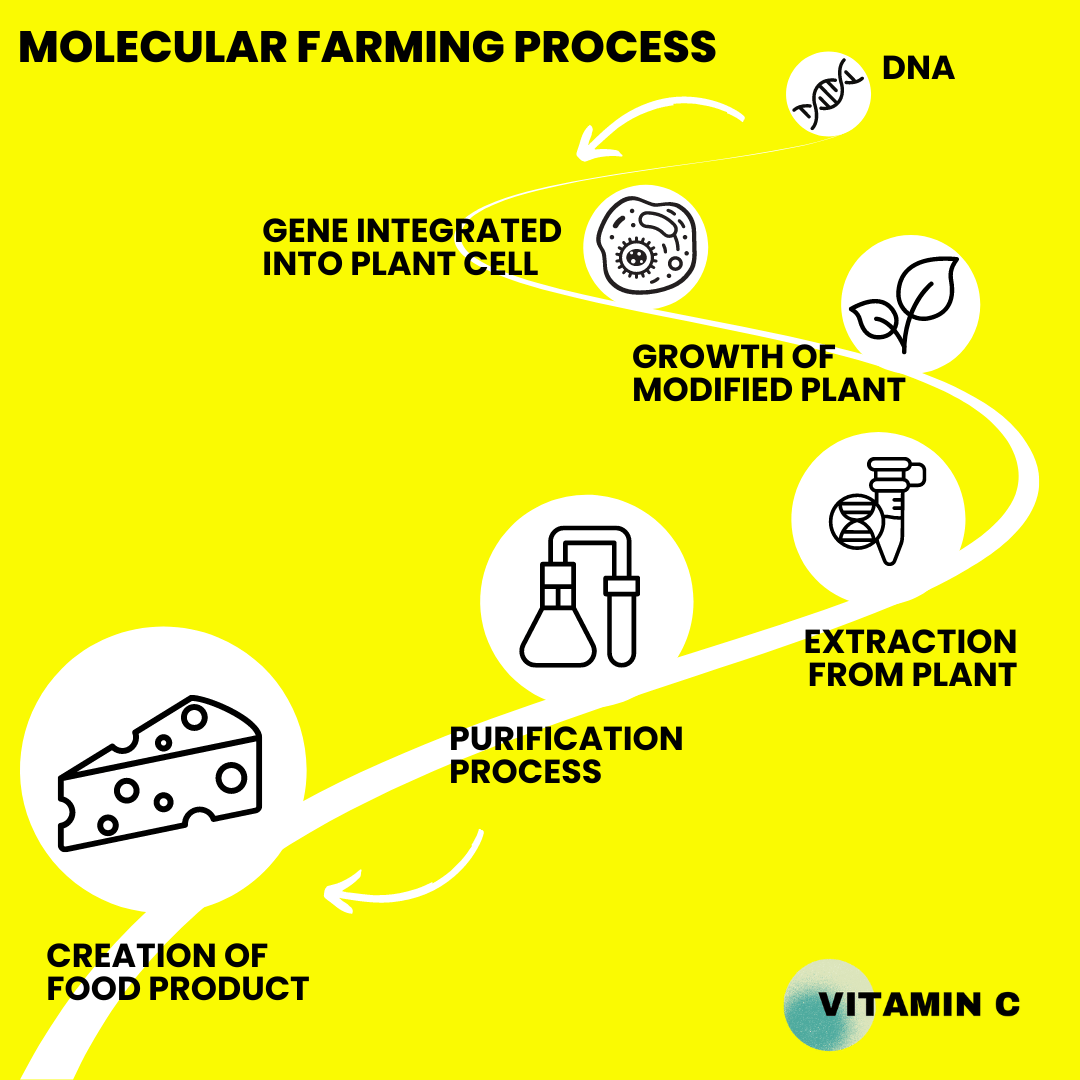
VITAMIN C ® is a newsletter exploring topics in food, climate and everything in between.
If you missed the last newsletters, you can look them up here.
Read time: 3 minutes 19 seconds
Hi friend 👋,
Lately, I’ve been obsessed with the concept of molecular farming. Wait what?
Molecular farming is the new cool kind on the block for sustainable production. It combines the efficiency of modern biotechnology with traditional farming. This approach has the potential to revolutionize food production and make our supply chains more resilient.
So this week, we're diving into this exciting new frontier of agriculture. Let’s break it down and see why molecular farming could be the next big thing.
1. [Insights]: Is Molecular Farming the Next Big Thing? 🌱🔬
Molecular farming involves genetically engineering plants to produce specific proteins that can be used as food ingredients or as pharmaceuticals. This method leverages the natural ability of plants to grow sustainably, offering a cheaper and environmentally friendly alternative to bioreactors.

Think of plants as mini-factories. By tweaking their genes, we can make them produce essential proteins efficiently and sustainably. For example, Moolec Science is creating plant-animal hybrid proteins to improve the taste and texture of plant-based meats. This approach not only reduces the environmental impact of meat production but also makes plant-based alternatives more appealing to consumers.

Let's Look at the Market! 🔍
United States
In the U.S., the regulatory environment is relatively straightforward for molecular farming. The FDA's process for approving genetically engineered food ingredients is clear and streamlined, allowing companies like Nobell Foods to develop and bring to market dairy proteins produced through molecular farming. The market for plant-based proteins in the U.S. is booming, with sales reaching $7 billion in 2020 and expected to grow at a CAGR of 14% from 2021 to 2027.
Asia
In Asia, countries like Japan and China are making significant strides in molecular farming. For instance, Japan's regulatory framework is evolving to support biotech innovations, including molecular farming. Chinese companies are also exploring molecular farming, particularly in producing pharmaceutical proteins and vaccines. The Asian alternative protein sector saw a 43% year-on-year rise in investments, highlighting the region’s growing interest in sustainable food technologies.
Europe
Europe, on the other hand, presents a more challenging regulatory landscape. The European Food Safety Authority (EFSA) imposes stringent regulations on genetically modified organisms (GMOs), which include molecular farming products. As a result, many European startups focus on producing growth factors for lab-grown meat instead of direct food ingredients.
Despite these regulatory challenges, Europe is a significant player in molecular farming. The region's focus on sustainability and innovation has led to substantial investments in this sector. For example, the European Union's Horizon 2020 program has funded numerous projects aimed at developing sustainable bioproduction methods, including molecular farming.
In a nutshell:
Molecular farming could drastically reduce the cost and environmental impact of producing essential proteins. From food to medicine, this technology promises a sustainable future. As regulatory frameworks evolve and the technology matures, molecular farming could become a cornerstone of modern agriculture, offering a more resilient food system.
2. Today’s Fast Snacks
[Good News Food]: 🥶 Whirlpool, a leading American multinational manufacturer and marketer of home appliances, started the "Feel Good Fridge" program in collaboration with Hello Fresh.
They are tackling food insecurity by refurbishing refrigerators, placing them in food banks and non-profits and filling them with left over foods. Since its launch, over 900 fridges have been distributed, providing more than 250,000 pounds of fresh food to families in need across the U.S. A great example of companies collaborating to reduce food waste. More here.
[Good News Climate]: 🚨 Big news! The EU Nature Restoration Law, was just adopted by the Environmental Ministers of EU member states. It marks a significant step towards reversing decades of ecosystem degradation.
Here’s the quick rundown:
🌿 20% Restoration by 2030: The goal is to restore at least 20% of EU’s land and sea areas by 2030.
🌍 Total Ecosystem Overhaul: By 2050, they aim to have all ecosystems in need restored.
📈 Milestone Target: Improving 30% of specific habitats from poor to good condition by 2030, with targets of 60% by 2040 and 90% by 2050.
💧 Ecosystem Focus: They’re going after peatlands (hello, CO2 absorption!), forests, grasslands, wetlands, rivers, lakes, and coral beds.
🚑 Urgent Repair: Right now, 81% of Europe’s natural habitats are in poor health. This law aims to fix that.
Read more here.

[Fun]: 🙌 Feeling inspired to make a positive impact on the world, but unsure where to start?
Check out this simple yet powerful graphic.
The intersection of these answers is your starting point for taking meaningful climate action. Whether it's through your career, hobbies, or community involvement, you can contribute to a more sustainable future by leveraging your unique skills and passions. Take a moment to reflect on these questions and then get started!

See you in two weeks
Sincerely,
Lia Carlucci
What did you think of today's newsletter?
—> If you liked this newsletter, you’ll love following along on LinkedIn. Or share this email with a food and climate-curious friend 🙌
